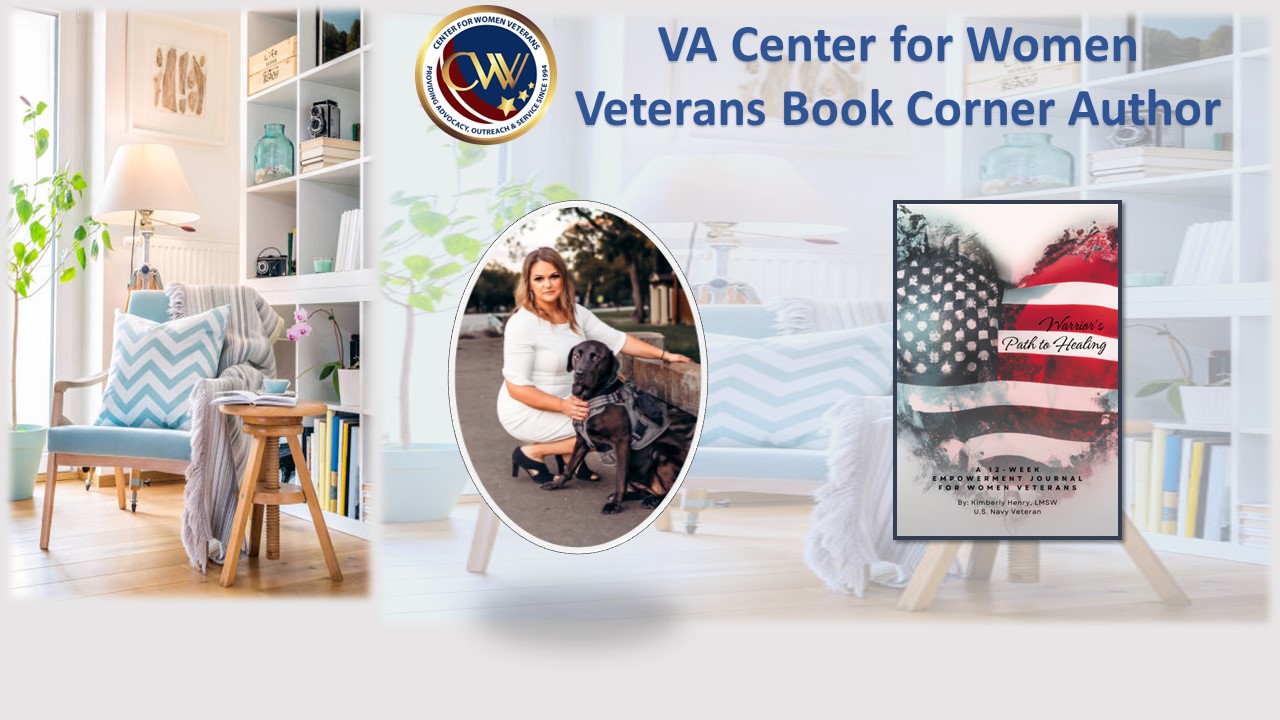Melissa, 45, said she was not in a good place, emotionally speaking, when she retired from the Army in 2013. After all, she had experienced her share of trauma during her 20 years of service, which included deployments to Bosnia, Iraq, Afghanistan and other hot spots.
Then there was the personal stuff, including a divorce that left her confidence and self-esteem at a low.
“I had a lot of things going on,” she said simply. “I was stressed out. I was beginning to think about taking my own life.”
She made a decision to move from Nashville back home to Huntington, W.Va., where she was born and raised. “I knew I had to do something, and do it quick,” she said. “So I moved home. About a week after I got home I went straight to the women’s clinic here at the VA and asked for help.”
Melissa said that moment marked the beginning of her journey out of the darkness. She was promptly assigned a counselor, began therapy, and even acquired a canine companion named Lilly who helps her stay calm in crowded public places.
“They taught me coping skills here, and they taught me how to relax,” she said. “Best of all, they’re good listeners. There’s a program support specialist here, her name’s Diania, who’s always there for me to talk to. She always listens.”
Melissa said a major turning point in her recovery was her decision to enter the Huntington VA’s Compensated Work Therapy program.
“That was a big step for me, going back to work,” she said. “I wasn’t sure I could do it. So I asked my counselor if she thought I was ready. And she told me I was. Her confidence in me made all the difference. It made me believe in myself again.”
And so Melissa went to work for the Huntington VA’s suicide prevention program, where she did a lot of “odds and ends” work, as she called it. This included helping out with various projects including going to outreach events where she distributed suicide prevention literature to fellow Veterans. She found the work satisfying.
“It gave me a purpose,” she said. “I came to realize I’m not working because I need money. I’m working so I can give back to Veterans. There are people out there who are worse than I was. I want to help them if I can.”
“She did a great job for us,” said Deanna Stump, a suicide prevention coordinator at Huntington. “She was so enthusiastic and jumped right into everything, especially when it came to outreach. She went with me to two different health fairs and did such a great job talking to the Veterans about the services we provide. She’s a natural at it.”
She’s a Veteran, she could relate.
“She sure is,” added Julie Brawn, another of Huntington’s suicide prevention coordinators. “Unlike Deanna and me, Melissa’s a Veteran; she could easily relate to other Veterans at these outreach events. She could share her experiences with them. She could connect with them.”
Melissa has since moved on from the Compensated Work Therapy Program and is now employed full-time with Huntington’s Mental Health Department. The Army Veteran said choosing a career with the VA is, for her, a good way to continue helping her fellow Veterans, a way of ‘paying forward’ the help she received when she needed it.
She said the work she does is nourishment for her soul.
“It’s a good feeling,” she said. “I haven’t felt this way in a long time, maybe 10 years. I’m not worried about myself now. I don’t have any worries at all.”
To learn more about health care and other resources available to women Veterans, visit www.womenshealth.va.gov
Need to talk with someone about how you’re feeling? Call the Women Veterans Call Center at 1.855.VA.WOMEN. All the representatives there are women, and many are Veterans themselves. They can connect you with the resources you need to start feeling better again.
Need immediate help? Call the Veterans Crisis Line at 1-800-273-8255 (Press 1) or visit www.veteranscrisisline.net
Topics in this story
More Stories
This month's Center for Women Veterans Book Corner author is Navy Veteran Kimberly Henry, who served as a Cryptologic Technician and Sexual Assault Victim Advocate from 2009-2019. She created "Warrior's Path to Healing: A 12-Week Empowerment Journal for Women Veterans."
The Medical Foster Home program offers Veterans an alternative to nursing homes.
Watch the Under Secretary for Health and a panel of experts discuss VA Health Connect tele-emergency care.







Hello. I’m not a women, but am a male navy veteran who was married 17yrs then cheated on and I fell apart. I had bipolar on top of it all I was getting into outpatient treatment for substance abuse from opiates from a back injury.if not for that and my counselor I’d probably be dead from the withdraws homeless, and my mental illness on top of it.they saved my life,but my journey is still not over.
Robert Wheeler
U.S. NAVY VET.
CIN
My god, I’ve been writing, scrolling, right now I’m getting emotional. April 2,1986 I was sole survivor in auto accident in Bitburg West Germany my husband Sp4.Dale Hunt and Sp4.Andrew Collins were killed. Head-on,front ,back,both sides,my husband jumped from drivers seat to passenger and saved my life. I’m now realizing I’ve been suffering from this thing called psychological trauma. I’ve been stagnated for decades today I finally found the right words to explain myself and the way I feel RIGHT NOW is making me cry real tears. Please respond to this and Help me also. My email is(redacted) my name Deatrice Hunt thank you. My reason for my comment
A list of some available resources and contact information was sent to the email address you provided.
Like most Gov.organizations I haven’t been heard. My husband, a Vietnam Vet, deceased, (2017), had insisted that I’d apply for Spouse survival Benefits.upon applying i learned that It could take up to a year before decision. And there are not guarantees I will be eligible. On a fixed income, no other means of support, no job prospects @72, and now having to claim bankrupcy, I’m underwhelmed with the VA’s claim for their, so called, assistance for widows and widowers.